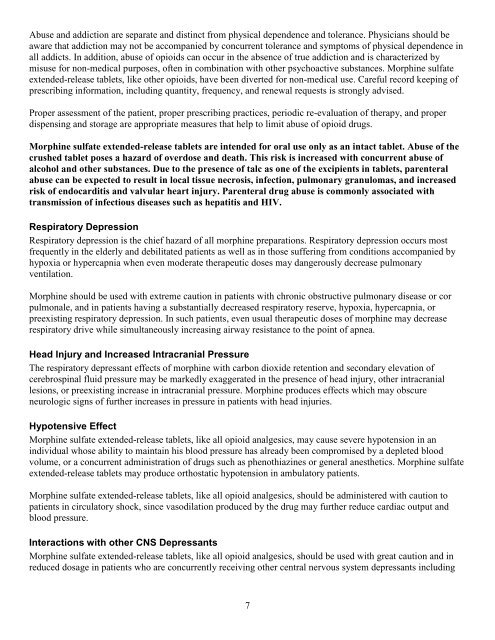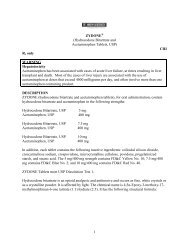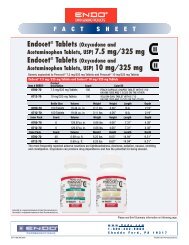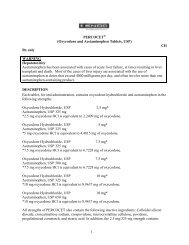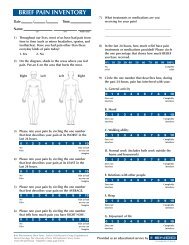Morphine Sulfate Extended-Release Tablets - Endo Pharmaceuticals
Morphine Sulfate Extended-Release Tablets - Endo Pharmaceuticals
Morphine Sulfate Extended-Release Tablets - Endo Pharmaceuticals
Create successful ePaper yourself
Turn your PDF publications into a flip-book with our unique Google optimized e-Paper software.
Abuse and addiction are separate and distinct from physical dependence and tolerance. Physicians should be<br />
aware that addiction may not be accompanied by concurrent tolerance and symptoms of physical dependence in<br />
all addicts. In addition, abuse of opioids can occur in the absence of true addiction and is characterized by<br />
misuse for non-medical purposes, often in combination with other psychoactive substances. <strong>Morphine</strong> sulfate<br />
extended-release tablets, like other opioids, have been diverted for non-medical use. Careful record keeping of<br />
prescribing information, including quantity, frequency, and renewal requests is strongly advised.<br />
Proper assessment of the patient, proper prescribing practices, periodic re-evaluation of therapy, and proper<br />
dispensing and storage are appropriate measures that help to limit abuse of opioid drugs.<br />
<strong>Morphine</strong> sulfate extended-release tablets are intended for oral use only as an intact tablet. Abuse of the<br />
crushed tablet poses a hazard of overdose and death. This risk is increased with concurrent abuse of<br />
alcohol and other substances. Due to the presence of talc as one of the excipients in tablets, parenteral<br />
abuse can be expected to result in local tissue necrosis, infection, pulmonary granulomas, and increased<br />
risk of endocarditis and valvular heart injury. Parenteral drug abuse is commonly associated with<br />
transmission of infectious diseases such as hepatitis and HIV.<br />
Respiratory Depression<br />
Respiratory depression is the chief hazard of all morphine preparations. Respiratory depression occurs most<br />
frequently in the elderly and debilitated patients as well as in those suffering from conditions accompanied by<br />
hypoxia or hypercapnia when even moderate therapeutic doses may dangerously decrease pulmonary<br />
ventilation.<br />
<strong>Morphine</strong> should be used with extreme caution in patients with chronic obstructive pulmonary disease or cor<br />
pulmonale, and in patients having a substantially decreased respiratory reserve, hypoxia, hypercapnia, or<br />
preexisting respiratory depression. In such patients, even usual therapeutic doses of morphine may decrease<br />
respiratory drive while simultaneously increasing airway resistance to the point of apnea.<br />
Head Injury and Increased Intracranial Pressure<br />
The respiratory depressant effects of morphine with carbon dioxide retention and secondary elevation of<br />
cerebrospinal fluid pressure may be markedly exaggerated in the presence of head injury, other intracranial<br />
lesions, or preexisting increase in intracranial pressure. <strong>Morphine</strong> produces effects which may obscure<br />
neurologic signs of further increases in pressure in patients with head injuries.<br />
Hypotensive Effect<br />
<strong>Morphine</strong> sulfate extended-release tablets, like all opioid analgesics, may cause severe hypotension in an<br />
individual whose ability to maintain his blood pressure has already been compromised by a depleted blood<br />
volume, or a concurrent administration of drugs such as phenothiazines or general anesthetics. <strong>Morphine</strong> sulfate<br />
extended-release tablets may produce orthostatic hypotension in ambulatory patients.<br />
<strong>Morphine</strong> sulfate extended-release tablets, like all opioid analgesics, should be administered with caution to<br />
patients in circulatory shock, since vasodilation produced by the drug may further reduce cardiac output and<br />
blood pressure.<br />
Interactions with other CNS Depressants<br />
<strong>Morphine</strong> sulfate extended-release tablets, like all opioid analgesics, should be used with great caution and in<br />
reduced dosage in patients who are concurrently receiving other central nervous system depressants including<br />
7


